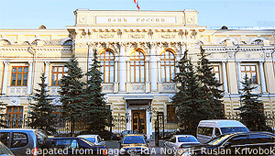RUSSIALINK: “Russians’ Debt Burden Hits Record High – Central Bank” – Moscow Times

(Moscow Times – themoscowtimes.com – March 26, 2021)
The average Russian borrower is spending more of their income repaying debt than ever before.
The share of income Russian borrowers have to spend on repaying debts hit a record high at the start of 2021, according to Central Bank data.
 The average debt burden — the proportion of average monthly income needed to cover both the interest and principal of loans — climbed to 11.7%, Elizaveta Danilova, head of the Central Bank’s financial stability department said Friday at a conference.
The average debt burden — the proportion of average monthly income needed to cover both the interest and principal of loans — climbed to 11.7%, Elizaveta Danilova, head of the Central Bank’s financial stability department said Friday at a conference.
That was up from under 11% before the coronavirus pandemic, she added, but said the increase was not a cause for concern.
“The debt burden has grown over the last year — that’s not surprising. It’s largely due to the pandemic and the decrease in people’s incomes, especially in the second quarter of last year,” Danilova said.
“Other factors, however, helped restrain the process. First of all, the reduction in interest rates. The debt burden has grown, but not as significantly as it could have.”
Russians’ disposable incomes fell by more than 8% in real terms during the second quarter of last year, as the country went into a six-week nationwide lockdown at the start of the coronavirus outbreak. Unemployment shot up and many workers reported being asked to take pay cuts or reduce their hours. Earnings recovered toward the end of the year as the economy picked up steam again, although real disposable incomes were still down 3.5% for the year — a sharper fall than in many developed countries.
The Central Bank also noted a surge in mortgage lending throughout the pandemic on the back of falling interest rates and a government-backed cheap mortgage scheme. Mortgage repayments now account for around a fifth of Russians’ monthly debt repayments, Danilova said.
Russian banks have been required to calculate borrowers’ personal debt burdens since a surge in short-term payday lending with high interest rates in 2017-18 spooked regulators and the government.
